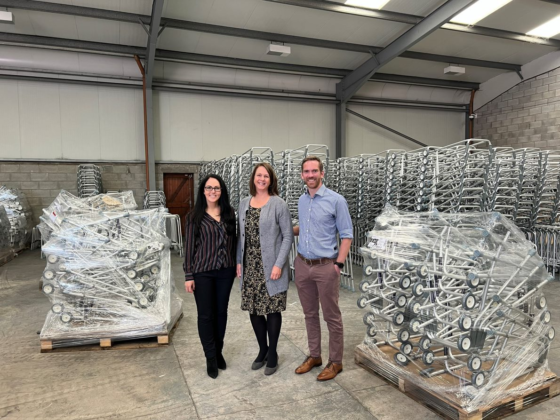Rationalisation Project Supports Walking Aid Supply Chain Resilience for West Yorkshire ICS
Our ICS benefitted from working with NHS Supply Chain for two reasons. The Clinical Engagement and Implementation Manager analysed and rationalised the current spending and suggested suitable clinical alternatives for review, which benefited our procurement. The Category Manager had the experience and knowledge of the market, the barriers to supply, the suppliers and the product ranges. The analysis presented back was precise, and the committed volume has ensured continuity of supply across the region.
Jaqui Yuen, Supply Chain Manager
Calderdale and Huddersfield Solutions Ltd
Calderdale and Huddersfield Solutions Ltd is a wholly owned subsidiary of Calderdale and Huddersfield NHS Foundation Trust, and Jaqui is also the Chair of the West Yorkshire Integrated Care System (ICS) Clinical Subgroup.
Overview and objectives
Between 2021 and 2022 the West Yorkshire region experienced supply disruptions of walking aid products due to supply chain and raw material shortages.
The aim of this project was to rationalise walking aid product purchases regionally across the West Yorkshire ICS group.
The group wanted to select suppliers with robust supply chains and build a contingency stock of the walking aids in the ICS store to manage future supply chain risks more effectively.
While savings were not this project’s primary objective, reducing product variation would allow the region to promote the reuse of walking aids, providing cost and resilience benefits, while supporting the ICS’s Green Plan.
The NHS Supply Chain team are pictured with a stock of walking aids following the rationalisation project.

Challenges
Wide product variation existed across the seven trusts in the ICS. There were 78 Stock Keeping Units (SKUs) used for standard walking aids (walking sticks, walking frames, crutches) from seven suppliers.
Engagement revealed several barriers to the reuse of walking aids, which would affect the ICS’s ability to support the NHS England target to reuse 40% of walking aids by 2025. The challenges included:
- Some trusts and equipment stores would not pick up or take back products if they were not initially issued at the same site.
- Uncertainty about the process for checking, cleaning and reissuing walking aids.
- Fear about litigation should a patient fall when using a reissued product.
The Process
To address these issues a process was carried out in stages:
- Identified the stakeholders, agreed and defined the project scope.
- Analysed direct and transacted spend data across all stakeholders.
- Carried out a virtual review of spend findings, product options and identified products for a table-top review.
- Carried out a table-top review including agreement on first and second choice products.
- Held discussions with suppliers to get the best prices and confirm their ability to handle an increase in demand.
- Achieved a final procurement sign off and agreement on the date to begin standardised purchases.
The analysis was prepared quickly by the team in NHS Supply Chain aided by their clinical team regards the variation. As a stakeholder group the information provided back was clear and defined so we could make relatively quick decisions regards what to evaluate.
The final negotiations on our behalf were handled by one of the team who was experienced in both the category and well versed with all suppliers. We had confidence that our committed spend would result in a continuous supply across the agreed product range.
Jaqui Yuen, Supply Chain Manager
Calderdale and Huddersfield Solutions Ltd
The Results
The West Yorkshire ICS has rationalised its standard walking aids range down from 78 to 16 SKUs from one supplier (one crutch, three walking sticks and 12 walking frames – six-wheeled, six non-wheeled). The user group chose products covering large height and weight bands, so less products are needed to cover the needs of most patients.
The smaller product list across all trusts reduces the barrier of walking aids not being accepted back, and the chosen products have guidance on checking and cleaning to facilitate reuse.
It is important to emphasise that savings were not one of the main drivers behind this project – this was the first step in an ICS collaborative procurement exercise.
The ICS’s primary objective to secure supplies and work in partnership to deliver a process around reusing walking aids was achieved. The next stage of the project will see the ICS implement a plan for regional reuse of walking aids, contributing to an NHS England target for 40% of walking aids to be reused by 2025.
Top Tips for Other Trusts
- Provide all direct spending from all organisations for the scoping document.
- Ensure the evaluation team includes clinical stakeholders who can evaluate the products.
- Engage with the NHS Supply Chain team regularly to keep the project on track pre-implementation.
Next Steps
To understand how we can support your trust, please speak to your NHS Supply Chain Integrated Care System Manager, or Category Manager for Walking Aids.
Useful Links
-
Aids for Daily Living
The framework agreement for the supply of Aids for Daily Living.
-
Customer Relationship Management
Find contact details for our Customer Relationship Management team here.
